































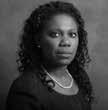














Legal THE UK MAGAZINE FOR ALL WOMEN WORKING IN LAW | NOVEMBER 2022
Years of Legal Pioneers � Centenary of admission � Mentoring � Work/Life Balance
Women
See
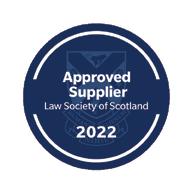

2 | LegalWomen Xxxxxxxxxxxxxxxxxxxxxx
Don’t change what you do. Just make it easier to do.
how Clio makes legal practice management easier.
Discover Clio today at clio.com/uk/legal-women or call +44-800-433-2546.
PUBLISHER
Benham Publishing







Aintree Building, Aintree Way, Aintree Business Park, Liverpool L9 5AQ Tel: 0151 236 4141 Fax: 0151 236 0440 Email: admin@benhampublishing.com Web: www.benhampublishing.com














 ACCOUNTS DIRECTOR Joanne Casey SALES DIRECTOR Karen Hall
ACCOUNTS DIRECTOR Joanne Casey SALES DIRECTOR Karen Hall


 STUDIO MANAGER Lee Finney
STUDIO MANAGER Lee Finney

MEDIA No. 1862

PUBLISHED













November 2022 © Legal Women Magazine, Benham Publishing Ltd.
LEGAL NOTICE
© Benham Publishing. None of the editorial or photographs may be reproduced without prior written permission from the publishers. Benham Publishing would like to point out that all editorial comment and articles are the responsibility of the originators and may or may not reflect the opinions of Benham Publishing. No responsibility can be accepted for any inaccuracies that may occur, correct at time of going to press. Benham Publishing cannot be held responsible for any inaccuracies in web or email links supplied to us.
DISCLAIMER
Legal Women Magazine welcomes all persons eligible to join our community regardless of sex, race, religion, age or sexual orientation. All views expressed in this publication are the views of the individual writers and not those of Legal Women unless specifically stated to be otherwise. All statements as to the law are for discussion and should not be relied upon as an accurate statement of the law, are of a general nature and do not constitute advice in any particular case or circumstance. Members of the public should not seek to rely on anything published in this magazine in court but seek qualified legal advice.
COVER INFORMATION
All images supplied by LW and used with permission: see LW website. Particular thanks to Gray’s Inn, Inner Temple, Middle Temple, Lincoln’s Inn and The Women’s Library.
Anyone
Editorial
To submit editorial, please send to: info@LegalWomen.org.uk
Editor-in-Chief: Coral Hill. Features Editor: Molly Bellamy. Sub-editors: Gillian Fielden, Tilly Rubens, Joanne Skolnick. Editorial Team: Amy Fullerton, Enya Hood, Charity Mafuba, Serena Reynell, Elizabeth Shimmell, Agnes Swiecka and Emma Webb.
LegalWomen | 3 Contents 5 Foreword 8 Centenary 11 LW Likes 12 Affinity Groups 13 Mind the Gap 14 Mentoring 19 Smart Working 29 Work/Life Balance 30 International 35 Events 36 Review: Prima Facie 37 LW Recommends 29 19 14 Find us online at: www.LegalWomen.org.uk
Copy Deadline 27th January 2023 For the February 2023 edition Advertising
wishing to advertise please contact Catherine McCarthy before the copy deadline. 0151 236 4141 catherine@benhampublishing.com
08

4 | LegalWomen Introduction How’s the weather looking this working week? Cloudy, but brighter with Quill. Quill’s cloud-based legal software is chock-full of new and improved features, giving you everything your law firm needs to manage your cases, contacts, and bills in just a few clicks. The result? A clear workflow, and a clearer head, no matter the weather. SCHEDULE A DEMO TODAY! 0161 236 2910 sales@quill.co.uk quill.co.uk MONDAY TUESDAY WEDNESDAY THURSDAY FRIDAY
The centenary of women’s admission to the legal profession is undoubtedly a milestone. The more I learn about their lives and the challenges they faced, the more awe-inspiring they are as role models. I was struck by the difficulty in obtaining images of these legal pioneers; completely unlike their male peers who were not only photographed but frequently captured in oil paintings. This element of invisibility, moving quietly in the background so as not to disturb the status quo, is our cultural norm. It means even the highest-achieving women can be quickly forgotten; such are the choices still made in terms of what is kept for posterity.
Young girls are still often held to different standards from young boys; behaving pleasantly without disrupting others is highly valued as a female attribute. This feeds through to working patterns, for example, worrying about being too challenging or asking for salary rises. We are all familiar with the double standards that are often exercised where a man’s confident behaviour would be considered pushy in a woman; or a woman being angry is construed as a ‘rant’. Julia Gillard, a former Prime Minister of Australia and now Chair of Global Women in Leadership at King’s College London, reflects on this with the ten-year anniversary of her ‘Not Now, Not Ever’ speech. Men have licence to vent anger politically, but this speech stood out around the world because it was a woman comfortable and eloquent in her anger. If you don’t know the speech you can find it here: Julia Gillard misogyny speech voted most unforgettable Australian TV moment: watch in full – YouTube
Cultural change requires embedding at a very early stage, and I applaud the fantastic work of End Sexism in Schools www.endsexisminschools.org.uk from campaigning on gender equality in sports, to ensuring that the school curriculum reflects the real demographic of society, so that History includes significant females as much as males; to highlighting the biased nature of the reading curriculum.
Workplaces more than ever, need to find approaches to redress

LW magazine is for everyone; lawyers, solicitors, barristers, advocates, judges, legal executives and those working as paralegals, legal secretaries, advisers or recruiters, the list is endless. We welcome the many male champions as readers and contributors.
Foreword
NOVEMBER 2022
the balance. The current recruitment crisis could be answered in no time if all the women who have left the work force were given the right opportunities and conditions. One approach to inclusivity is acknowledging difference and providing affinity groups and mentors for any group, not within the perceived mainstream for that job. The results can be life-changing. This issue looks at these experiences.
Although women have always worked, today, we are amongst the first to be pursuing careers throughout our professional lives and we’ve gained much ground, but it is still new territory. How are businesses going to ensure the baton is passed on? The latest Law Society report shows a startling low number of female partners. What do these businesses offer to attract more women? The consultants, Accenture, report that there is often a disconnect between what women wanted and what they got. They wanted to feel valued and to have control over where and when they worked. This was rated far more highly than the conventional rewards for senior staff of the big office with a view. Mothers often leave the workforce, but Accenture found that the overwhelming majority would prefer to continue working, if there were no obstacles. A workplace which works for individuals also reaps the rewards in terms of productivity.
Equality at law is often assumed to mean everything is solved for women. That just isn’t the case. So, it is vital to support each other to ensure change. A key part of this is joining an affinity group either in your workplace or elsewhere. ■
Hill Founder & Editor-in-Chief

LegalWomen | 5 Introduction
“I’m no longer accepting the things I cannot change…I’m changing the things I cannot accept.”
– Angela Davis
© Columbia GSAPP. CC BY 2.5.
Coral
Coral Hill
■
■
■
Our mission is to:
Provide clear information on gender parity
Inspire practical initiatives to create real change
Promote innovation in leadership and practice

Editorial Board
We are delighted to receive advice from the distinguished members of our Editorial Board. Full biographies are available on our website.

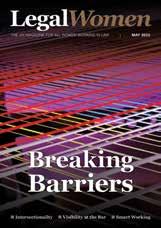
ENGLAND & WALES
Christina Blacklaws
Past Presdient of The Law Society of England and Wales. Christina is a multi-award winning published author, speaker and frequent media commentator on innovation and diversity and inclusion.
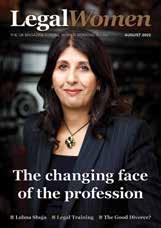
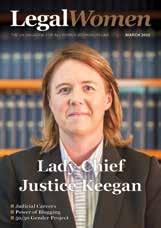
Millicent Grant QC (Hon) FCILEx
Millicent is a former President of the Chartered Institute of Legal Executives (2017/18) and currently a member of the Institute’s Appointments and Scrutiny Committee. Millicent has worked to tackle diversity and inclusion on the legal profession and judiciary, contributing to the Preapplication Judicial Education (PAJE) Programme. She is the only Chartered Legal Executive to be appointed an Honorary Queens Counsel. She is chair of the Knights Youth Centre, an independent youth work charity.
Janem Jones practised for many years as a partner and senior partner in a West Wales firm where she specialised in Family Law, Education Law and Criminal Law. She now works as a consultant for Williams and Bourne as an experienced advocate.
Sally Penni MBE is a barrister at Kenworthy’s Chambers, Manchester, whose practice encompasses Criminal (including Cyber Crime) and Employment Law. Sally is a Bencher at the Honorable Society of Gray’s Inn, Founder of Women in the Law UK and regular broadcaster of the highly acclaimed podcast.
NORTHERN IRELAND
Karen O’Leary leads Caldwell & Robinson’s Family Law practice. Qualified to practice in Northern Ireland, the Republic of Ireland, England, and Wales, Karen is regularly consulted by government and state agencies on legal matters from other jurisdictions. She is a Fellow of the International Academy of Family Lawyers (IAFL).
SCOTLAND
Alison Atack
Past President of The Law Society of Scotland. Formerly, Alison was a member of the Regulatory Committee and convener of the Client Protection Sub-Committee. She was a partner at Lindsays.
Volunteer positions at Legal Women
Currently, all of us are volunteers to get this publication going. If you would like to be involved in:
■ sourcing and checking copyright on images
■ working on events and following up funding opportunities
■ writing content for social media, blogs and magazine features
Feel free to email info@LegalWomen.org.uk with brief details about yourself. ■

LegalWomen | 7 Introduction
On these shoulders we stand
On 6 and 7 November 1922, 100 years ago this month, Maud Crofts, Carrie Morrison, Mary Pickup and Mary Sykes made history as the first women to sit The Law Society’s final examination, the final stage in their journey to become the first women to qualify as solicitors in England and Wales. Later the same month, on 17 November 1922, ten women were called to the Bar of England and Wales and were some of the first women to practise as barristers in England and Wales. (The centenaries for Scotland and Northern Ireland are slightly different - see insert box). LegalWomen asked Katie Broomfield and Elizabeth Cruickshank to reflect on this centenary, the obstacles faced, and progress made, by women since the historic moment they were first admitted to practise as members of the legal profession. First, Katie Broomfield, as a barrister herself, concentrates on the first women barristers.

First Women Barristers
The call of ten women to the Bar of England and Wales on 17 November 1922 was widely reported in the press, with high hopes expressed for the women’s prospects. Their admission to the profession was made possible by the passing of the Sex Disqualification (Removal) Act, which removed all legal barriers to women, including married women, working as lawyers. However, as a brief look at the careers of some of the women reveals, this was only the beginning, with women continuing to strive for equality in the legal profession.
Monica Cobb
(1891–1946):
First woman to hold a brief
A fortnight after she was called, Monica Cobb became the first woman to appear as counsel in an English Court, instructed to prosecute in a case of bigamy. The Daily Mirror reported that: “Wearing wig and gown, she briefly addressed the jury as to the circumstances of the case, which throughout she conducted very clearly, securing a conviction.” The question of what women barristers should wear was hotly debated as there were real concerns that the admission of women to the profession would lead to the abolition of the wig with grave consequences for the administration of justice! Although it was eventually decided that women would wear the same wig as men, this was not without controversy. In November 1922, the Evening Standard reported: “Women Barristers’ Hidden Tresses: Wigs make them look like men”; and in 1924 Monica Cobb commented that: “Sometimes I am addressed by witnesses as ‘Madam’ but more often as ‘Sir’.” Earlier this year LegalWomen (May 2022, pp.14–17) reported on the issue of the (in)visibility of women barristers in the profession and if, as Brenda Hale, the first woman President of the Supreme Court, suggests, the wearing of men’s wigs: “humanise[s] all of us into men” this further impairs the visibility of women in the profession.
8 | LegalWomen
Centenary
Beatrice Davy (1885-1966): Requalified as a solicitor
In 1928 Beatrice Davy contributed a chapter to a careers’ advice book for girls. Reflecting on the hardships faced by women barristers she warned that: “For a woman who must earn her own living the Bar is the very last profession in the world.” Although the Sex Disqualification Removal Act meant the Inns of Court could no longer reject any suitably qualified women, barristers could not be compelled to accept women members of chambers nor solicitors to instruct them. As a result, Davy decided to qualify as a solicitor and set up her own firm of solicitors, forming the first all-women partnership. One of the women barristers Davy subsequently instructed was Enid Rosser (called 1927) who recalled Davy’s strong feeling: “that until there were solicitors willing to brief women barristers their future prospects were hard and dim.” The latest statistics reveal that women are still more likely to choose a career as a solicitor, with women making up more than half of all practising solicitors but only 38% of barristers (The Law Society Annual Statistics Report 2021; Bar Standards Board)
Sybil Campbell (1889–1977): First woman judge
It was not until 23 April 1945 that Sybil Campbell was appointed the first woman full-time professional judge in England and Wales, when she became a stipendiary (paid) magistrate at Tower Bridge Police Court. She earned a reputation for severe sentencing but, despite protests and calls for her dismissal, she continued to sit as a stipendiary magistrate until 1961. The following year, Elizabeth Lane was appointed the first woman High Court Judge but it was not until 1988 and 2004 respectively that Elizabeth Butler-Sloss and Brenda Hale were the first women appointed to the Court of Appeal and the House of Lords (now the Supreme Court). On Elizabeth Butler-Sloss’s appointment, she was known officially as “Lord Justice ButlerSloss” and addressed in court as “My Lady, Lord Justice ButlerSloss.” This was changed by the Courts Act 2003 and “’Lady’ was officially acknowledged as a separate title for women judges in the Court of Appeal although in the Chancery Division women remain invisible behind the title ‘Master’. Moreover, as the latest statistics reveal, while women represent 50% of tribunal judges they still make up only 35% of court judges (Diversity of the judiciary: 2022 statistics)
Helena Normanton (1882–1957): First Woman KC
A staunch campaigner for the opening of the legal profession to women, on Christmas Eve 1919 Helena Normanton was the first woman to be admitted to any Inn of Court the day after the Sex Disqualification (Removal) Act was passed. She achieved several firsts in the legal profession including being the first woman barrister to appear in the High Court and the Central London Criminal Court (the Old Bailey). Although she practised as a barrister until her retirement in 1951, she struggled to make enough money as a barrister and supplemented her income through public speaking and writing, including contributions to the Notable British Trials series and her Everyday Law for Women. Despite being disappointed not to be made a judge, she was, in 1949, one of the first woman to be appointed King’s Counsel in England and Wales. Although women are now joining the legal profession in equal numbers to men, it remains the case they are underrepresented in the upper echelons of the profession. As the latest statistics reveal, only 18% of King’s Counsel are women (Bar Standards Board)
Theodora Davies (1898–1988): Balancing a career and family life
Balancing work and family life has been an issue for women lawyers since the Sex Disqualification (Removal) Act was passed. As Theodora Davies recalled upon her marriage in 1929: “I decided that I’d rather devote my time and interest to
joining my husband and the work he was doing. In those days it wasn’t very customary for married women to work apart from their domestic duties and it didn’t really occur to me that it would be possible to combine the two.” Although such attitudes are no longer voiced, the main issues facing women lawyers remain the structural and cultural norms which place the burden of domestic responsibilities disproportionately on women thus creating barriers to a more equitable legal profession. In September this year, First 100 Years launched their Mothers in Law Survey to identify what can be done to help women juggle their responsibilities so that they can remain in the profession and rise to positions of power. After all, everyone will benefit from a legal profession which more accurately reflects the diversity of the population. �
Called to the Bar on 17 November 1922
ETHEL ASHFORD SYBIL CAMPBELL
MONICA COBB
THEODORA DAVIES
BEATRICE DAVY LILLIAN DAWES
AUVERGNE DOHERTY
HELENA NORMANTON NAOMI WALLACE ELSIE WHEELER
Sex Disqualification Removal Act
The Sex Disqualification Removal Act applied throughout England, Ireland, Scotland and Wales. The first woman to qualify as a lawyer following the Act was Madge Easton Anderson, who in 1920 was admitted as a law agent in Scotland. In 1936 she sat The Law Society’s final examination and was subsequently admitted as solicitor in England and Wales. The first women barristers anywhere in Great Britain and Ireland were Frances Kyle and Averil Deverell, who were called to the Bar of Ireland on 1 November 1921. Later that month Kyle was also called to the Bar of Northern Ireland. Ivy Williams was the first woman called to the Bar of England and Wales in May 1922. The first woman called to the Faculty of Advocates in Scotland was Margaret Kidd, in July 1923. Revealing the obstacles women faced, Kidd remained the only woman advocate in Scotland for 25 years. She was the first woman in the UK to be appointed King’s Counsel in 1948.
Katie Broomfield Postgraduate Researcher at Royal Holloway, University of London and co-author of First: 100 Years of Women in Law

LegalWomen | 9 Centenary
First Women Solicitors
The Sex Disqualification (Removal) Act 1919 made it illegal to refuse entry to the solicitors’ profession on grounds of sex alone, but it did not oblige qualified solicitors to take on women as articled clerks nor to instruct women barristers. Nevertheless, in the decade that followed this Act, 101 women did qualify as solicitors of the Supreme Court of England and Wales. Elizabeth Cruickshank reflects on who these women were, their backgrounds and motivations.
The effects of the First World War
The First World War hastened the entry of women into the profession. 5000 solicitors and articled clerks served in the armed forces and by the end of the war, 906 had died with many others unable to continue working. One result was that The Law Society asked members to train suitably qualified young men who had served in the War without demanding premiums and supported the Solicitors (Articled Clerks) Act 1918, which permitted articled clerks to count time spent in the Armed Forces as a year’s good service for the purpose of articles thus considerably shortening the period of training.
The Law Society decided that any concessions should apply equally to all articled clerks regardless of sex. Carrie Morrison was one of the very few women, possibly the only one, able to take advantage of this ruling because she had spent a year working for the Army of the Black Sea in Istanbul. In 1922, Carrie Morrison became the first woman to qualify in England and Wales.
Education
The women admitted as solicitors in this period were at least as well educated as male solicitors. Twenty-six of the first 101 women solicitors had the benefit of a university education and several won prizes in the Law Society Finals Examinations. The formidable, chain-smoking Agnes Twiston Hughes BSc was not only the first woman in Wales to qualify as a solicitor but she came first out of all candidates in the 1923 examinations. Later she became senior partner of her family firm, the Mayor of Conwy and the Captain of the Conwy Golf Club.
Some of the older women qualifiers had already acquired useful legal skills working as clerks in solicitors’ offices. Others worked as teachers before turning to the Law as soon as the 1919 act was passed. Carrie Morrison, who in 1922 became the first woman to qualify in England and Wales, worked as a teacher for a time until she concluded that “I hated it, and that was bad for the children I had to teach”.
Paying for training
Most early women solicitors came from solidly middle-class backgrounds, and some from extreme wealthy ones. Ulrica Anne Hastie (who qualified in 1927) lived in Knightsbridge with her mother, solicitor father, one sibling and seven servants! Only a very small number of the women who qualified in the first decade were less privileged, for example, Catherine Tietjen, the daughter of a hotel waiter who came first in the 1924 final examinations. She was so valued by her principal that 5 years later, he made her a partner.
A significant barrier to the aspirations of working-class men and women was the substantial sum required to be paid for training. This upfront premium demanded by most solicitors was in the
order of £300 to £500 when as little as £250 per annum might be earned on qualification. This was a serious expense for most families, especially so for a daughter who might marry relatively soon after qualification.
Therefore, in many parts of the country, the only possibility for training was with a father or near male relative. Even before the passing the 1919 Act young women had been employed in solicitors’ offices in a clerical or “paralegal” capacity. For a solicitor father there were advantages to employing a daughter. He felt able “to keep an eye on her”, obtained intelligent and, initially at least, cheap or unpaid labour, justified on the basis that his daughter was able to enjoy the benefits of living at home.
Grace Brown (a 1925 qualifier) was given the option of continuing her studies and becoming a teacher like her mother or “coming with me to the office”. She chose the latter course and fortunately “enjoyed the whole experience of being a solicitor”, giving it up only when she married.
However, the experience of being trained by a close family member was not always positive and the power of Twentieth Century paternalism cannot be underestimated. Crane Ritchie (who qualified in 1924) was given articles as a Christmas present by her father. Dorothy Morgan qualified in 1925 but her nephew considered that her father “made it almost impossible for her to marry and to leave him, and she was at times torn between staying with him and going out with handsome young barristers”.
Benefits
Being able to rely on her own earning power meant that a woman did not have to depend on a husband and 40% of the women who qualified during this period did not marry. The death toll of the First World War undoubtedly removed the potential opportunity to marry for many women – in 1921 there were 1,720,806 more women than men in the population.
Therefore, qualifying as a solicitor gave young women a certain degree of financial independence and the insurance policy of a set of very marketable skills if adverse circumstances developed. Janet Mack (who qualified in 1930) left the profession after marriage but by returning to practise as the first woman solicitor in Cheltenham, was able to support her children and mother while her husband was in the Army.
The legal qualification undoubtedly enabled many of the first qualifiers to lead varied lives where they were able to combine managing their own legal practices with sporting interests and take a full part in politics and serving their local communities. Maud Crofts, one of the first four women to sit The Law Society’s final examination in 1922, was a keen tennis player and Agnes Hughes (1923 qualifier) was a good putt on the golf course. Mary Elaine Sykes, who sat the examination with Maud Crofts in 1922, went on to become Mayor of Huddersfield.
Progress
In 1957, thirty-five years after women were first admitted as solicitors, The Law Society published details of the number of women holding practicing certificates. There were 356 female as opposed to 19,000 male solicitors (1.8% of the profession). Since then the position has changed slowly but significantly. In
10 | LegalWomen Centenary
1967 there were 619 women solicitors (2.7% of the profession). Latest figures available show there are 80, 881 women solicitors (53% of the profession) with more women than men entering the profession (The Law Society Annual Statistics Report 2021). However, there is one statistic which does not indicate a positive surge in women’s progress, which is women making partnership.
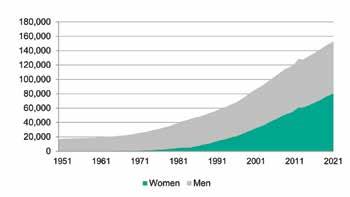
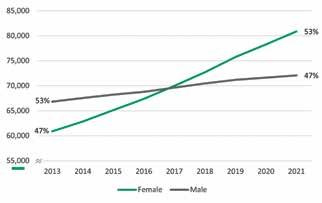

While there are currently 27,364 partners, only 8,930 of them are women (18%). Some women solicitors have chosen to follow careers outside private practice as they are more flexible and family-friendly. However even this may change, if we want it to, as firms appreciate that women do possess those legal skills and talents which some solicitors mistakenly felt they lacked one hundred years ago. �

Elizabeth Cruickshank is an author, solicitor and former editor of LINK, the magazine of the Association of Women Solicitors (no longer in publication).
LW Likes
The Female Lead | @the_female_lead
“When I was growing up... there weren’t any female role models” Jane Goodall gets her own Barbie doll. ■


Amy Stout | @AmyJStout
I’m absolutely over the moon to have been appointed a DDJ! I applied just after coming back from maternity leave, whilst pregnant and due to go on maternity leave again. I feel very lucky to have been appointed despite taking 2 years out and juggling the care of tiny ones. ■
Goldman, PhD | @GretchenTG
Had a great week with the @GCULaw Gender, Law and the Legal Profession students, who wrote bios of ‘first’ women lawyers around the world in our digital map. Learned about so many women I knew nothing about –from 15th century to today! ■

LegalWomen | 11 LW Likes
Gretchen
Just so I'm being honest. #SciMomJourneys ■
Seonaid Stevenson-McCabe | @seonaid90
Affinity Groups
Any group suffering a disadvantage can benefit from affinity groups. They create a place to exchange thoughts and gain the insights of others who may have experienced similar issues; you can at least gain a sympathetic hearing and may be able to give advice, giving you confidence to act differently and change your environment. There is no set template perfect for every firm or organisation. LegalWomen wants to explore these groups and ask organisations: when are they appropriate? What do they do and why?
LW asked Shabnam Ali-Khan from Russell-Cooke to reflect on what works for her firm.
Russell-Cooke
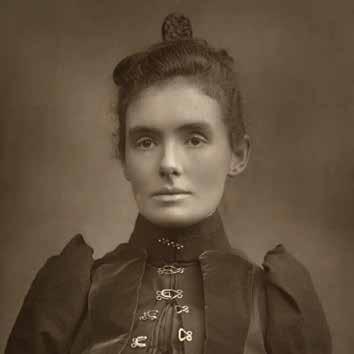
Women lawyers are more than half of the profession yet, as we all know, do not have parity in terms of decision-makers in firms or organisations across the whole profession. It is essential their voices be heard so they are an integral part of change in the legal profession and one method is through a women’s group, regardless of the name which is used.
Women’s affinity groups can be a fantastic platform for all types of women to come together to celebrate success and provide support and guidance to other women. Increasingly law firms, such as Russell-Cooke, have encouraged these groups and ours is the Women’s Networking Group (WNG). Miranda Green, a partner at Russell-Cooke who heads the WNG describes it as being there to “support, inspire and uplift women across the firm by creating opportunities to network, debate, and develop relationships with others internally and externally”. It is welcoming to all women ranging from junior level to partner level and provides a useful opportunity for sharing and learning together.
The WNG activities include networking within the firm and externally. This is invaluable as the events allow women to grow their professional and social networks. WNG also arranges talks on important topics as well as engaging with local charities in support of women’s rights. A recent example is a working with Smart Works, a charity that mentors unemployed women and provides clothes to attend interviews and start new jobs. It is a great initiative and enables women to apply for jobs with confidence and take on new roles.
One of my main concerns about affinity groups, which I am sure many others share, is to ensure they are not simply a tick-box exercise but rather a force to drive meaningful change and raise awareness. With any affinity group a mission statement is crucial alongside regular meetings/catch ups to monitor outcomes and discuss initiatives.
Russell-Cooke’s Heritage Russell-Cooke is proud of its WNG which pays tribute in part to Mrs Maye Russell Cooke, the wife of its founder who was a leading figure for women’s rights. In 1885 she published the Women’s Suffrage which led to the National Society for Women’s Suffrage. Miranda says “Maye’s passion for campaigning and the equality agenda she championed are principles which thrive today in Russell-Cooke”. She goes on to explain “ours has been a firm that stands for equal rights, for liberal values and for ‘doing the right thing’. This runs through the firm and its people”. This ethos is further demonstrated by the work the firm is involved in which includes representing victims of female genital mutilations, domestic violence, and childbirth-related clinical negligence.
Equality, Diversity and Inclusion (EDI) is high on everyone’s agenda, and it is important for law firms to embrace this actively. I have met new recruits at Russell-Cooke and other firms who make it clear that EDI policies and activities within a firm can play a huge role in deciding where to apply for a job. I think there is something quite special in being a firm with strong affinity groups which potentially attract vibrant and fresh energy into the legal workforce. �
Shabnam Ali-Khan Partner Russell-Cooke
If you would like to write about the group at your workplace please email info@LegalWomen.org.uk.
12 | LegalWomen Affinity Groups
Margaret known as Maye Dilke campaigner for women’s rights by Herbert Rose Barraud (1891). © Public Domain Mark 1.0.
Mind the Gap


Laura Uberoi, Senior Associate at Macfarlanes, wrote about “The Missing Middle” in LegalWomen’s August edition1. She was referring to the noticeable scarcity of Senior Associates, Junior Partners and aspiring General Counsels at training and networking events, and on committees and boards. This she attributed to the many competing pressures on time for those at these stages of their careers. She made some insightful recommendations for actions to encourage participation by those who are juggling multiple responsibilities including young families, care for the elderly, and running a home.
I would argue that thinking and acting on this situation should start at an even earlier career stage. From an organisational perspective, research shows that 81% of entry-level Associates leave their law firm within 5 years and this results in substantial costs to any firm. We know that the Covid-19 pandemic, and how firms have responded to it in terms of working practices, has arguably led to higher attrition and staff turnover, as well as lower engagement and less team cohesion. All of this is in the face of workloads increasing by the day.
I have often thought that mid-level Associate years could benefit from more support. At 4 PQE, Associates are on a steep learning curve in terms of technical knowledge. Business development expectations ramp up as they look to make Senior Associate within the next year or so. Even though not yet leading on deals, mid-level Associates are expected to be project managers. They will almost certainly be responsible for the delegation to and supervision of trainees and NQs, sometimes without much training on what effective supervision entails. The extent to which these arrangements are formalised can vary greatly.
If we want to ensure there is a “middle” to participate in law firm life, and crucially, to build a pipeline to partnership, we need to ensure that we’re looking after our people before they get to the point where competing pressures on time are at their maximum. Key here, of course, is to remember that whilst this tends to happen in our thirties, there will be solicitors for whom caring and household responsibilities start much earlier. I have had countless conversations with female Associates who, seeing the pressures their senior colleagues are under, are no longer sure they can “have it all” and so are limiting their aspirations even at a relatively junior stage in their careers.
There is much discussion in the legal profession of “work-life balance”. A salary increase or retention bonus may be seen as the counterweight to the “work”, but there may be more effective ways to get the balance right. In a “Roll on Friday” survey at the start of 2022, a junior Associate at a US firm asked “What’s life?”.
Here are some recommendations for decision-makers which might lead to more stable, engaged and productive teams.
1. All those with supervisory responsibilities should be trained to manage inclusively, that is, with an understanding of an increasingly multi-generational, multi-cultural workforce comprised of individuals whose goals, challenges and needs are likely to have shifted considerably over the last few years. In this I include not only those who have leadership positions, such as Partners and Senior Associates, but anyone who delegates and gives feedback to others. Much of the time training on supervision is given to those who are responsible in name, but not to those who are actually “at the coal face” and supervising others on a daily basis.
2. Supervisors should be coached to understand the importance of getting to know their team members and how their work fits into their wider life commitments and/ or aspirations. There are some solicitors who will be on a steeper growth trajectory, who want to make Partner, and will be willing to do longer hours and compromise other elements of their life to achieve their ambition. Others will not.
3. Firms should provide as much support as possible to aid solicitors in growing their developmental networks and having access to role models. The more they have access to role models, and the more they understand what the firm has done to support those at more senior levels to reconcile work and home life, the better things will be. We should actively encourage those who have had positive experiences combining client work, corporate citizenship for the firm, and home life to be visible at events and on committees –and find ways to recognise and reward their contributions accordingly. �
Laura Simpson
Laura Simpson is an accredited Executive Coach, Inclusive Leadership Development Facilitator, and Founder of Altura Coaching. To find out more about her work, please go to www.altura-coaching.com.
1. https://issuu.com/benham/docs/legal_women_ august_2022/11
LegalWomen | 13
Mind the Gap
Mentoring
Mentoring is a relatively new concept. Many older lawyers may have had mentors, but they rarely used that title. Often mentors emerge through work or other contacts, but increasingly arrangements are set up by someone independent of both the mentor and mentee; it might be through an educational institution, charity or workplace etc.



The role of the mentor differs from the concept of role models or sponsors. Role models are people who may inspire others by simply being visible within a profession but may not ever have the opportunity to talk to individuals. A mentor is someone who will meet and chat with the mentee about their aims and progress, perhaps give guidance or suggestions. It can range from the occasional cup of tea to a more structured relationship with spaced meet-ups for specified periods of time. A sponsor is more personally invested, and this may arise from a mentoring relationship. A sponsor is actively promoting the individual and possibly ensuring they receive exposure to particular experiences at work to ensure they are in a position to be considered for other roles.
Here, we concentrate on mentoring. Salma Maqsood discussed its importance in the very first LegalWomen magazine and highlighted the role of the Bristol Law Society https://issuu. com/benham/docs/1817_legal_women_launch_2020__lr_/11 We’ve included Salma’s suggestions in our Resources Box.
Although you might look for mentors through a scheme you do not need to limit yourself in that way. In the August LegalWomen ( https://issuu.com/benham/docs/legal_women_ august_2022/11) Laura Uberoi said ‘’Ideally you should have at least four [mentors]: one inside your organisation and team, one inside your organisation in a different team, one lawyer outside your organisation and one non-lawyer outside your organisation. This ensures a diversity of viewpoints. People often struggle to find mentors, particularly a mentor outside of their organisation, however, don’t be shy in approaching someone who you have heard give an inspiring lecture or that you know of but have not met in person. The worst that can happen is the person you ask says no!’’. �
14 | LegalWomen Mentoring
Images courtesy of David Smith using DALL-E.
Mentoring Advice
Sally Penni MBE, Barrister


I don’t think I have really had any formal mentors. There were some informal people, whom I used to run things by, and trust perhaps, other than my pupil master. Mentors are so important, and whilst I have mentored many others, the key moments have been around a return from maternity leave, or from caring responsibilities; it has not escaped my attention that most carers are women. Other moments, have been in relation to a return after some form of trauma or separation. Another key instance, is when women have experienced some kind of knock-back or rejection, especially after a long period in the profession, when they begin to reflect on their progression in the law, whether from Managing Partner to Judicial Appointment or to Silk.
What advice do you have for those at an early part of their career looking for mentors?
I would advise finding someone you truly admire! Once you’ve found them, ask them to mentor you because they are a real role model or because, in some small way, they encourage you. This may be, in the way they juggle their careers and their family life; the way they try to bring other women up; or the way they hold themselves professionally.
I would also advise not ‘cold calling’ them, or asking them to look at your CV, or discuss an essay for you. But rather, take a gentler approach. Perhaps, try one of the many the formal schemes available through the Law Society, the Bar Council, or Women in Criminal Law, and seek out one of the many mentoring schemes that are available. I would say, good luck! And, do not give up! None of us are ever too old to find a mentor…and it is never too late!
How did you find mentors and how did it help you?
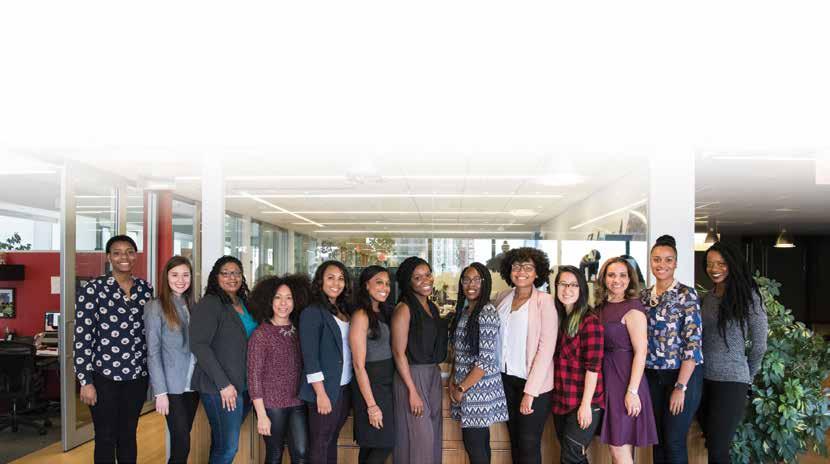
Early in my career, mentorship wasn’t really a ‘thing’. It was not a common concept and was not something I was highly aware of. However, I most definitely sought out role models and ‘wise women’ to guide and inspire me, albeit more informally than what I would now regard as a mentorship relationship. For me, it was about admiration- who did I want to be like when I was ‘grown up’? And curiosity- how did she become this amazing woman? I have always found those women to be gracious, generous with their time and enthusiastic in their support. Can I name check a few please? The incredible Fiona Woolf, Helena Kennedy and Lucy ScottMoncrieff. Super women- in every regard-each of them.
What advice do you have for those at an early part of their career looking for mentors?
Firstly, make sure you know of the support that is available within your firm or business. There are often opportunities that go under-promoted or schemes that have slightly fallen into abeyance that you could resurrect. If not, then be proactive, identify those people who have something they can teach you, ways they can support you or help your career. And then approach them. So many young women are reluctant to do this, but you mustn’t be! Both the young women I currently mentor approached me directly and I said yes, and I bet you will have equal success. If they really are too busy then ask for a quick chat and see if they can recommend others. Be persistent- finding the right mentor provides you with huge advantage- don’t give up. And also, be open, different people can offer your different types of support or wisdom. �
LegalWomen | 15 Mentoring
Christina Blacklaws, Past President of The Law Society of England and Wales
We asked our editorial board whether they had mentors in their careers and for advice on finding them. Here is what they said:
How did you find mentors and how did it help you?
I didn’t seek out mentors – I would say I was fortunate enough to be placed with them during the early years of my career. I was fortunate enough that the managers I worked for and with, both served as mentors. I was in my late teens/early 20’s. Both were men, significantly older than me (over 50) and were managing clerks in the firms they worked for. They were regarded as fonts of knowledge for advice on practice and procedure. Both were amongst the first to qualify as Legal Executives after the examination was introduced. They both encouraged me in my studies and wer good examples for me. One modelled the type of lawyer I wanted to be – multidisciplinary able to be knowledgeable and efficient in many areas of law. The other helped me to develop a robust attitude towards challenging circumstances with work and in the workplace. He would make a point of stretching me to find answers for myself, whilst at the same providing guidance and support and provide me with opportunities to develop self-confidence and openly be an ally to me in front of others, who would be inclined to overlook my abilities. At the time, I started work it was a requirement of the Institute of Legal Executives that their members worked in the legal profession whilst they studied to qualify. I worked initially in small firms as a junior legal secretary with the intention of becoming a legal executive. Both men gave me levels of responsibilities others (in larger firms) may not have given me. Both helped me by giving me the confidence to resist the pressure of being pigeon-holed into what others expected of me (on the basis of race, gender, education, social class age) and work through the limitations some sought to impose.
What advice do you have for those at an early part of their career looking for mentors?
Look for someone who as at least the stage in their career you aspire to achieve in yours, someone who is confident in themselves, patient and understanding and approachable.
Karen O’Leary
How did you find mentors and how did it help you?
When I was embarking on the beginning of my legal career, I was not aware of any formalised mentoring schemes. I instead reached out to experienced professionals who I admired and sustained those relationships. I found that there were a lack of female role models and a lack of mentors when I was starting out.

What advice do you have for those at an early part of their career looking for mentors?
My advice is to engage in mentoring schemes, as there are now an abundance of resources available to young lawyers seeking a mentor. I am part of mentoring schemes for Women in the Law UK, The Law Society of Northern Ireland and with Trinity College Dublin. The importance of building relationships and sustaining those relationships cannot be underestimated. The relationships formed through mentoring are as valuable to the mentor as they are for the mentee. If you are engaging with a mentor, always remember that there is no such thing as a stupid question. Young lawyers, and especially young female lawyers, tend to struggle with imposter syndrome. They think that they should have all the answers, but of course they do not, as this knowledge comes from experience. You gain the

most value from having a mentor if you ask the difficult, scary, or ‘stupid’ questions.
Atack, Past President of The Law Society of Scotland

I was not aware of being formally mentored when I started my legal career in what was then a large firm. I feel it is only in the last decade that this terminology has been used formally for the relationship with someone who supports us in our career. This role was provided seamlessly by the excellent personnel from the Senior Partner to the office manager (who imparted extensive knowledge with glee to the yearly intake of raw legal recruits straight from University).
Now there is so much more structure to the role and relationship with the Mentor. It is more likely to choose someone external rather than a line manager in your work team. The plus points in the external coach are you chat away from the office environment, where there may not be so many time restraints and interruptions.
When I was training there seemed to be limitless time to train and develop us. One strong memory is the Senior partner, quite daunting older man (there were no female partners then) who was very caring I came to realise, taught me how to write a concise legal letter, scoring out the “we should be obliged” s and other long-winded phrases beloved of the newly qualified lawyers! All partners invited us to sit in with them at client meetings to learn, by osmosis really, the niceties of how to look after clients from beginning to end - something now taught on the Diploma with varying success.
Hugely important for the future, I learned about networking and joining other organisations, meeting peers, building relationships, engaging in discussions with them and potential clients -all fostered by my seniors. With four Past Presidents of the Law Society of Scotland in their midst, I naturally turned to giving something back to the profession by volunteering for Committee work with The Law society of Scotland. I was very well-served by this “in-house” role model coaching (I have tried hard to replicate with young lawyers) but I am very much aware that not everyone has connections or is treated with the kindness, guidance and support I have had.
It is a luxury to have someone give time entirely to listening and helping you, other than a well-meaning friend. It’s easier to have someone well-trained, giving their time outside work entirely to you, helping and encouraging. You can open up freely admitting vulnerability or problems, making you better equipped to build a career path and feel emotionally supported.
The match must be right. The trained mentor must ask the right questions to know what the true position is to support the mentee, building rapport and trust and having regular meetings. You must feel you can open up to this person, a close confidante for probably the next year. Scottish lawyers through the Law Society of Scotland have an online Mentoring Platform, allowing mentees to find a mentor match. �
16 | LegalWomen Mentoring
Millicent Grant KC (Hon), Past President of the CILEx
Alison
Would you like to mentor?
Mentoring is a powerful tool but not only for the mentee. Mentors at all levels are surprised by what they gain from participating, insights to other people’s worlds, learning about yourself, enhancing your professional development and often simply enjoyment. There are many different opportunities from a wide range of legal groups and beyond. See our resources box below.
Most mentoring schemes have clear responsibilities so that they are not overwhelming and often provide training. An example is Career Ready – a social mobility charity that connects young people to the world of work and currently recruiting mentors.
“Mentoring is one of the most rewarding experiences I’ve had in my professional life. You feel a real sense of pride when you see a formerly shy young person grow in confidence and achieve their goals.” – Daniel Busson, Capita, Career Ready mentor.
You’ll meet a young person for 1 hour per month, in your office or at the school, and give them the support they need on their journey from education to employment. Career Ready will support you every step of the way as a volunteer and you will receive a package of support including training, briefing calls and handbooks as well as onboarding/ongoing support.

You can register as a mentor and find out more here or join one of the weekly events to find out more. Book your place here: www.careerready.org.uk/events or contact Sangeeta Bhopal, London Regional Manager sangeeta.bhopal@ careerready.org.uk �
Resources for mentors or mentees
A fuller list is available on the website Resources page.
� Networks and support for women lawyers | The Law Society www.lawsociety.org.uk/topics/women-lawyers/networks-and-support-for-women-lawyers
� Mentoring 101 | The Law Society www.lawsociety.org.uk/topics/the-city/mentoring-101
� www.lawsociety.org.uk/topics/blogs/keeping-close-supervising-and-mentoring-trainees-remotely � www.lawsociety.org.uk/topics/lgbt-lawyers/sra-stonewall-lgbt-mentoring-scheme
� Social Mobility Foundation www.socialmobility.org.uk/social-mobility-news/become-mentor-smf/
� Law Society of Scotland Mentoring Scheme www.lawscot.org.uk/members/career-growth/mentoring/
� Lawscot Foundation Mentoring Scheme www.lawscotfoundation.org.uk/support-us/become-a-mentor/
� Legal Geek Mentorship www.legalgeek.co/mentorship/
� The 93% Club www.93percent.club
� Contact your university or college most will have mentoring schemes
� Law Society – Race for inclusion: The experiences of black, asian and minority ethnic solicitors www.lawsociety.org.uk/topics/research/race-for-inclusion-the-experiences-of-black-asian-and-minority-ethnic-solicitors
� Law Society – Achieving Change Together: empowering and supporting Black lawyers www.lawsociety.org.uk/topics/ethnic-minority-lawyers/achieving-change-together-empowering-and-supporting-black-lawyers
� Bar Council ‘Mentoring at the Bar Guide’ www.barcouncil.org.uk/uploads/assets/d6317cda-26a5-4d70-8706e71d21e475b5/Mentoring-at-the-Bar-guide.pdf
� The Bar Standards Board Race Equality Taskforce Mentoring Scheme www.barstandardsboard.org.uk/about-us/equality-and-diversity/race-equality-taskforce/race-equality-taskforce-reversementoring-scheme.html
LegalWomen | 17 Mentoring
Pay it Forward
Picture the scene. It is summer 2015. I am 20 years old, and due to commence my final year of studying for the LL.B. in one months’ time. I have not secured a training contract despite a plethora of applications, in fact, I have not even been offered an interview. I am becoming increasingly aware of my dearth of legal contacts. In an attempt to rectify this situation, I decide to join the Scottish Young Lawyers’ Association (SYLA) as a member and attend a networking event that it has organised.
I remember getting ready for the event in my student flat –picking out the one suit I owned; the nervous walk along Bath Street in Glasgow; checking in at reception and finally, entering the room. Crowds of delegates who appeared so familiar to one another were huddled in small, seemingly impenetrable groups. Wracked with what is now commonly known as ‘impostersyndrome, I left the event after 25 minutes, having said very little, convinced that I would never be engaging or clever enough to make it through a full networking session.
It is now October 2022. I am 27 years old, and as of September have been practising as a fully qualified solicitor for 2 years. I am a commercial litigator with an international firm, and am now the Vice President of the aforementioned SYLA, having served on the Committee for the previous 3 years.
So how does one progress from hiding in the bathroom at networking events, to relishing them? How did I move from the infamous traineeship-hunt, to where I am now? What happened along the way?

Mentors happened: Accidental mentors in the form of friends and family; more formal mentors in the form of colleagues and superiors who empowered me to unlock potential that I never knew existed. Those who took the time, not to provide all the answers, but to create an environment in which I could discover those answers for myself. These mentors challenged me to reassess situations, setbacks and fears in line with my ambitions and achievements. They did not personally bring my confidence to life, but more powerfully, allowed that confidence in my capabilities to grow from within.
The benefits of mentoring are endless, not only for the mentee, but for the companies and organisations for which they work. An example of a simple but effective tiered mentoring scheme is run by my own firm. By pairing individual trainee solicitors with those who are newly qualified, ‘new-joiners’ have regular but formal access to those who have recently lived the
trainee experience. Trainees and mentors set their respective expectations and boundaries for the sessions, for example, how often they will meet, and what development needs will be targeted and addressed before the next session is convened.
The evidence speaks for itself. Mentored-trainees develop a ‘can-do’ attitude, flowing from their mentor’s candour about the challenges they too had to overcome. Role models begin to emerge and appear more accessible. Confidence grows as development needs are met, and with each session, new targets are unlocked. A business can only benefit from putting such measures in place.
Cast your mind back to the start of your own legal journey. Did you navigate this new terrain completely alone? I suspect that the answer to this question is no. It cannot be disputed that mentoring has an important role to play in promoting social mobility. The Social Mobility Foundation’s mentoring scheme demonstrates this. SMF students (of both school-age and university level) are high achieving young people from lowincome backgrounds. They are paired with mentors from their chosen profession, who assist them through the likes of applying to college/university or preparing for job interviews. Through mentorship, this extremely worthwhile programme seeks to eradicate inequality of opportunity, and to allow aspiring professionals not only to realise, but to reach, their full potential.
It is likely that you are already a mentor of sorts. Have you already scaled part of the metaphorical ladder and shared some tales of your ascent for the benefit of another? If so, accidental mentor, have you considered placing your mentoring capabilities on a more formal footing? Much like the benefits of mentoring, opportunities to mentor are now somewhat unlimited.
They say to “surround yourself with people who would mention your name in a room full of opportunities”. I say, let’s be those people, and open opportunities for those climbing up the ladder behind us. �
Patricia Taylor Solicitor DWF LLP

18 | LegalWomen
Mentoring
How to take a headshot
Aready photo is essential for an online presence or use in publications. I recently had photos taken and asked what the top tips are when thinking about headshots, especially if you can’t afford to pay for professionals. Here is Sadia Barlow’s advice:
We would always recommend professionally taken photos, because no matter how good your mobile device, you simply cannot beat a photo taken by a professional who understands all the components for a good photo. However, we do know that there are many circumstances where you need to take a photo and have no other option but to do it yourself. So here are the 7 essential points to consider when setting up your shot.
1. Look for the light source. The sun, a lamp or a naturally bright room, no matter where you are, just look for the light as this is going to help your exposure. I love to place my clients facing a large window or at a 90-degree angle to a light source. Experiment to see which angle is more flattering. For me, there is nothing more illuminating than having catchlights in your eyes (white, or bright reflections of the light source).
2. Check the background for any distractions. So many instances where we have seen headshots with a pole in the distance coming out of a person’s head, or a branch or other similar distractions. Instead, think of how to frame the shot. You can use natural foliage or architecture, or if possible, find a blank white space like a wall or a door.
5. Think of where you are going to use the headshot and remember one thing; your body should face the written content. The reason for this is what we call the ‘reading line’. You want to keep the person interested and to read more, therefore your body is going to take the viewer from looking at your image to naturally following the ‘reading line’ to the content. This is something we tell all our clients. If you are unsure where you are going to use the photo, make sure you take photos with both poses; ie body facing right and body facing left.
3. Set up your camera on a tripod or get someone to take the photo – do not take a selfie! Your online presence should show professionalism and taking the time to think through the shot, is so important. It says a lot about you and just how seriously you take your profile. Remember, first impressions count!
4. Take the time to prepare your outfit, hair and accessories for the shoot. Both men and women need to remove the shine with a little translucent powder. If you have bushy eyebrows give them a little gel and comb, the same goes if you have a beard or moustache; just tidy up. Check your ears and nose for hairs that are long and noticeable and if so, remove with haste! If you have short hair, a little hairspray and gently running your hand over your hair will get rid of those pesky stray hairs standing up!
6. Relax. If you feel uncomfortable in front of a camera, play some music and do some gentle exercises to help loosen those tense muscles. So, shoulder exercises, face exercises, etc.
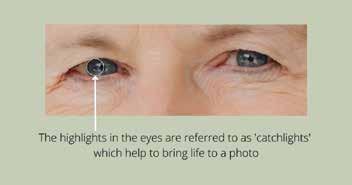
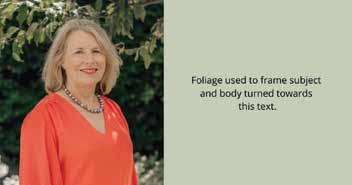
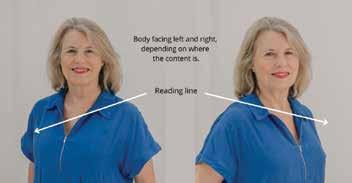
7. Last but not least, look directly at the camera and smile! A smile that reaches your eyes gives the impression of a person who exudes warmth and likeability. If you don’t particularly want to smile, then smile with your eyes. Remember, if a headshot doesn’t give an immediate, positive first impression, then you’re probably doing yourself a disservice. �
Coral Hill photographed by Sadia Barlow Photography www.sadiabarlowphotography.co.uk info@sadiabarlowphotography.co.uk
LegalWomen | 19 Smart Working
Dresses are a wonderful choice for the working woman. They really do simplify your life and with the right style they are a fabulous way of looking smart, professional and feminine.

Shirt Dress
The shirt dress has always been a favourite of mine – they give you the polish of a shirt but come with the ease of a dress. There are of course many variations on the shirt dress theme. If you are petite (something I know all about!) then a shirt dress with a tie belt is a good pick. This will enable you go for a shirt dress that is a little longer than perhaps your usual length as it adds structure and helps ensure you will be less likely to look overwhelmed with the fabric.
The trio of shirt dresses below are the Tallulah Shirt dress.
All Dressed Up
By Jennifer Ison
If you are on the taller side, then you can afford to have one that is a more fluid and voluminous shape as you have the height to carry it off. A spot print is a good way too of injecting interest without being too bold. LK Bennett’s Tallis Navy and Yellow Spot Print Shirt Dress is a stylish example of this:
https://www.lkbennett.com/product/DRTALLISPOLYESTER BlueNavy%20Golden%20Yellow~Tallis-Navy-And-YellowSpot-Print-Pleated-Shirt-Dress-Navy%20Golden%20Yellow
Whatever your height, you can experiment with wearing the neckline buttoned up to the top or leaving open for a more relaxed look. The beauty of a shirt dress is that you can wear it all year round – just add tights and knee-high or ankle boots for the winter and you are ready to go.
Shift Dress
A shift dress is another classic for the office – versatile, simple and elegant. Best if you can find one that is made from a soft fabric with just that little bit of stretch to mould to your body and flatter your curves.
For a great example see the Beiwen Dress below. The dress was one of the items labelled as The Power Dress by The Telegraph earlier this year. Red is definitely an empowering colour to wear (see more below on choice of colour).


Smart Working
20 | LegalWomen
Shift dresses are cross seasonal dresses which will give you added value and enable you to get a lot of use out them yearround. I always think that a dress with ¾ sleeves rather than full length sleeves can lighten the look and can allow you wear your favourite bracelet to greater effect.
V-necks give the impression of length – and it is also a flattering neckline.
A single block colour for your dresses is such a smart choice –you can dress them up and give added interest and individuality as wished with jewellery or silk scarves. Most commonly when picking a dress for the office, we do tend to go for the more conservative colours – black or navy but I would ask you to reach out to deep reds, purples, greens or even fuchsia. These are well suited to the workplace when you need to make an impact. I would suggest having both types of colour palette available to you so you can always find the perfect colour choice.
Dresses with a flare
Dresses with a flare give you more freedom of movement, look great and make it easier too when running for the train!
Two popular choices in the Jennifer Anne range are the Bronte Dress in a gorgeous taupe crème Italian metallic thread boucle or for a more conservative choice the Maurier Work Dress which comes in black or navy.

Sweater Dress
For the cooler days, it is always good to have a sweater or jumper dress. Scarves and jewellery are a great addition. Again choosing a dress with ¾ sleeves makes it a little lighter on the eye.

Pair your sweater dresses with court shoes or boots. The Winterson Sweater Dress pictured below is made from a viscose blend of fabrics with a gorgeous texture and is a great example of a sweater dress – a real gem.
Wardrobe Planning
Planning your work wardrobe is probably something that has been on the back burner for the last couple of years. Now, with many lawyers finding that they are back in the office for at least a couple of days a week, it is a task you may find yourself spending more time thinking about even if you have not yet put any plans into action. Dressing well for work is so important for lawyers, it really affects how you are seen and how you yourself feel inside. For all the reasons set out above, I would suggest you start with dresses! �
Jennifer Ison is a former City lawyer and founder of petite clothing brand Jennifer Anne. Her clothes and brand have been featured in many publications including The Telegraph, The Independent, The Stylist, You Magazine, Good Housekeeping. Clothes are available online at www.jennifer-anne.co.uk or appointments can be made to try on the clothes in Wimbledon Village.
jennifer@jennifer-anne.co.uk Instagram: @jennifer_anne_petite
LegalWomen | 21 Smart Working
Taylor Rose MW is a top 60 law firm with over 30 offices nationwide and we are seeking legal professionals that are keen to work on a consultancy, fee sharing basis.
We are seeking likeminded individuals and groups of Solicitors, FCILEx or Licensed Conveyancers with 4 years PQE+ to join our consultant programme.
We provide lawyers with a unique opportunity to thrive as part of our consultant arrangement, taking back control of their life and earnings in a smart, modern and supportive environment.
You can choose to work from home, one of our offices or both!
Why choose us?
Earn up to 75% of what you bill; minimum earning 70% Choose your own clients, fees, hours and volume of work

· Work from home, 100 days access to hot-desking facilities
PII cover up to £20 million Free calls via our app Access to nationwide offices and meeting rooms Fully optimised CMS and electronic systems Access to business development Dedicated liaison team and technical head for ops, legal support and training
To find out more, read our brochure or arrange a confidential call, please email consultantrecruitment@taylor-rose.co.uk or visit our website www.consultant-solicitor.co.uk
22 | LegalWomen Xxxxxxxxxxxxxxxxxxxxxx
“The ethos of the firm is progressive and forward thinking, always trying to benefit clients, staff and consutants. The move to Taylor Rose MW has been life enhancing.”
Felicity Marsden, Consultant Solicitor & Partner
Enjoy a career without limits, earning up to 75% of your billing.
Time Management – a waste of time?

Today’s lawyers are buckling under ever more hectic work schedules, juggling the demands of work and personal and family life. But if all the articles on time management actually worked, wouldn’t we have moved on to another topic by now? Maybe it is time for a new approach.
Lawyers struggling to manage competing priorities and get things done are not actually grappling with time management but rather with focus, motivation and energy management. Once solicitors figure out how to gain and maintain their focus, and what drains and sustains them, they can change how they work, making time management far less of a problem. These are my top three tips for getting more done:
1. Manage your Focus Research has shown that the average office worker gets interrupted every three minutes, but it takes 23 minutes to get back into a ‘flow’ state where we are fully immersed in what we are doing. How can we achieve that focused and productive mode if we don’t have a way to silence those distractions?
Perhaps you believe you have no choice, that this is the price you pay for doing high-quality, high-pressured work for demanding clients. But is that actually true? What do people really want from you? Your clients want pithy and practical advice. Your seniors want work that requires minimal input from them so they can get the advice to the client as soon as possible and focus on the work that requires their attention. That way, time is leveraged effectively, giving value for money to the client and efficiencies to the firm.
So, it’s time to manage expectations:
� Explain to your team that you will be offline for the next hour getting x done.
� Forward your telephone to voicemail.
� Close all your apps and put your mobile phone in a drawer, or better still another room.
� Set a timer so that you don’t distract yourself by checking the time.
� Get some work done!
2.
Manage your Motivation
Do you find yourself putting certain things off? Do you panic to get something done when the deadline looms, but then not organise your work any differently the next time? That has nothing to do with how you are managing your time.
Procrastination is our brain’s way of keeping us safe and away from something it perceives as a threat. When you dig deep, you will find that fear or some other negative emotion is keeping you stuck. Once you identify what is holding you back, you will have a way forward. �
LegalWomen | 23
Smart Working
Fear
Underlying emotion Limiting belief Way forward
I can’t do this
I don’t know where to start
Lack of connection/disinterest
Resentment
What support do I need?
What if I write all my ideas out and see what emerges?
I don’t know what’s expected of me What clarity will be helpful and where will I get it?
I can’t see the point in this
Who can help me understand the importance of what I’m doing?
How can doing this help me achieve one of my goals?
I’ve been dumped on
How do I want to negotiate this kind of task in the future?
What boundaries do I want to put in place for myself?
Again, this is not about managing your time but rather taking action to address whatever is blocking you.
3. Manage your Energy
How aware are you of when you’re most able to focus and get into a flow state? There are physical reasons our energy fluctuates throughout the day. When we understand our own patterns, it is easier to decide what to do when.
For example, we have a natural dip after eating, particularly if we have loaded up on carbohydrates. Tackling a tricky piece of legal analysis or thinking on your feet during a negotiation probably isn’t the best idea just after lunch.
We have personal ebbs and flows too. That explains why some of you are surprised to find yourself still at the office at 8pm when everyone else has gone home.
If you get stuck on a point, reenergise by looking or going outside, running up and down a flight of stairs or stretching. You may also want to not do anything at all because this ‘unfocusing’ switches on the brain’s default mode network to unleash your creativity. You can then pick up your work where you left off with renewed vigour.
In short, pay attention to the times when you are able to focus easily on your work and how much you get done. Then plan your day where possible to do any intellectually challenging work at the times when you are at your sharpest.
Don’t try to manage your time. Instead, manage your focus, your motivation and your energy. You will find yourself getting much more done in the same amount of time. �
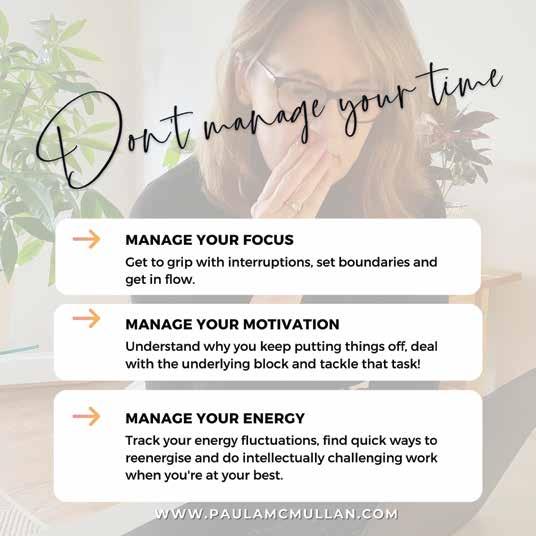
Paula McMullan
Paula McMullan is the Career Coach for Lawyers, helping lawyers at a crossroads to secure their next promotion, land their next opportunity and make an impact in their new role. www.paulamcmullan.com

24 | LegalWomen Smart Working
Quill’s interview with Rachael Gent, Managing Director, Gent Law

Law firm start-up tips: one year later
In Quill’s recent ‘Starting a law firm: Lessons to survive your first year’ webinar, Managing Director Rachael Gent, who started Gent Law in her dining room, shared her tips with her fellow female panellists on how budding entrepreneurs can launch their own legal practice.
Here’s her story…
How did you get started in law?
Children are often asked what they want to be when they grow up. While others were talking about being a doctor or a policeman, I was immediately drawn to law. Ironically though, I chose to study criminology and law but hated my first year. I decided, before I changed career paths, I would spend some time at a law firm first.
Luckily, this was back in 2007 when the housing market was booming and a large conveyancing firm agreed to take me on as a conveyancing assistant. I ended up working during the day and going to law school in the evening. This employer was a huge advocate for me and paid for my courses. I came out of university with four to five years of solid legal experience behind me and thoroughly enjoyed working at a law firm. By which point, I knew it was the right career.
How did the idea of launching your own law firm come about?
I was chatting with an estate agent friend over coffee. We were both on board with working together and quickly acknowledged we were on to a viable business opportunity worth exploring – a gap in the market for a different type of law firm offering in our area. The two of us became business partners.
The experience gained at my earlier employers gave me the knowledge and confidence to apply my learnings and do it for myself. Gent Law was born and the rest is history.
Describe the start-up process and how you overcame any challenges along the way
The most difficult part was submitting for SRA approval. Regulatory approval took twelve months almost to the day. We used professional consultants from the get-go to help us secure SRA accreditation I would definitely recommend investing in hiring a consultant to speed things along.
Quill has been with us since the very beginning and has served us well. While big corporates have the luxuries of an in-house IT team and on-premise servers, we saved on costs and maintenance by opting for Quill’s cloud-based solution. We chose to use a case management provider for our conveyancing specific needs, which integrates seamlessly with Quill’s legal accounts software.
For me, I knew from my experience at larger law firms that a proper case and practice management system would be a key tool that I’d need to invest in, but I was glad to have the people at Quill backing me – they’ve helped dozens of budding
entrepreneurs like myself get up and running quickly, and they are reasonable and realistic on price. We’ve been pleased with their support and partnership ever since.
How good is your work-life balance?
Usually, I’m strict in finishing work at 5pm each day. Of course, there are always occasions when you forget to do things – run your payroll, for instance – or need to finish off tasks left undone. I often clear the decks in the evening whilst my children are sleeping to get ready to go again the next day!
I fit my two children around work. My children just see our offices as “mummy’s workplace” and are in and out of it all the time –and that’s exactly the way I like it. The pandemic proved that we can all work from home. Quill’s cloud-hosted software greatly assists with flexible working and I actively promote this for all my employees – of whom there are now ten and rising with possibly a new office in our sights in the future.
What parting words of wisdom would you give to other entrepreneurs keen to set up a law firm?
If you’re considering starting your own law firm, brace yourself! It’s worth the reward but you’ll have to put the work in. You’re responsible for others and it’s a weight on your shoulders.
Building client relationships are key as that’s what grows your business. It’s not just about being a qualified solicitor. You wear a lot of hats and must be comfortable with that.
Relationships generally are so important. I’ve already mentioned accessing consultancy support to bridge your skills gaps. Plus choosing the right banking provider as you need someone you can call for ad hoc support in the midst of completions and rely on to ensure your client accounts are accurate at all times.
When planning your finances, budget what you think with more on top. And plan comprehensively and proactively. Your business plan should cover everything and be a live, ever-evolving document.
Invest in the right software for you – choose wisely and consider systems that are hosted and affordable, like Quill. �
Learn more
Read about Quill’s practice management and legal accounts software at www.quill.co.uk/legal-software. Watch Quill’s ‘Starting a law firm: Lessons to survive your first year’ webinar at www.youtube.com/watch?v=eNY6g6_dLd0
LegalWomen | 25 Advertisement Feature
GCS – Explore our Broad Range of Legal Indemnity Solutions

Guaranteed Conveyancing Solutions (GCS) is a market-leading provider of legal indemnity insurance for ‘Residential’ and ‘Commercial’ properties and ‘Developments’.

Our comprehensive range of policy solutions are available on an ‘Instant Issue’ basis in our insurance ‘Pack’ and/or our speedy ‘Online’ system. As the name suggests, conveyancing professionals can issue these instantly without referral or delay, so their clients are covered immediately.
Alternatively, conveyancers can simply contact us, by phone or email, to have policies issued ‘Direct’ from our office. No matter how simple or complex the issue is, our experienced and friendly underwriters are always happy to help. Nothing is too much trouble!
Our expert underwriters have an average of 16 years’ underwriting experience. We pride ourselves on our excellent service and fast responses – so
it’s no surprise that we are trusted by over 20,000 conveyancers across the country.
It gets better! We’ve recently added SIX brand NEW policies to our ever-growing policy solutions, and these are available to issue NOW by phoning or emailing our expert underwriters.
� Road Adoption � Sewer Adoption � Combined Adoption of Road & Sewer � Breach of Section 52 or 106 Agreement � Lack of Party Wall Agreement � Rights to Park
These new policies will also be available to issue on GCS ‘Online’ in November 2022, so keep your eyes peeled.
To find out how we can help, please contact us using the details below. For more information, please visit www.gcs-title.co.uk �
26 | LegalWomen Advertisement Feature
...of market-leading legal indemnity insurance cover for all types of properties and developments. Quotes in seconds, policies in minutes Comprehensively worded policies Competitively priced premiums Multiple issuing options No risk too simple or too complex Expert advice from experienced underwriters Explore our broad range... Guaranteed Conveyancing Solutions Limited (authorised and regulated by the Financial Conduct Authority) Registered in England & Wales No. 3623950 Registered Office: ECA Court, 24-26 South Park, Sevenoaks, Kent, TN13 1DU gcs-title.co.uk 01435 868050 underwriters@gcs-title.co.uk Find out more: www.gcs-title.co.uk/LW Pack Bespoke Online Direct
Developing an online presence
I
n my usual training programmes, I compare developing an online presence to going on a diet; whether this is to lose weight, gain muscle etc. When you want to make a lasting change, eating healthily for a few weeks and going to the gym once or twice isn’t going to make a big difference. It’s the same with an online presence, if you want to see results you must create a plan to reach your goal.
Here are some of the most important elements of developing a solid online presence.

Consistency
Before you even start planning what your online presence will look like, you must consider how much time you can devote to it. This is critical because of the way search engine and social media algorithms work and you need to train them to your schedule. There is no point posting every day for two weeks only to burn yourself out and then you go down to once every other week as it’s actually detrimental to your progress. A bit like going hell for leather at the gym for a week only to find you are exhausted and can really only manage twice a week.
I post on LinkedIn twice a week on set days and post on Instagram once a week. I find this is a manageable amount and any more than this would be too challenging. You need to consider what would work for you and build that into a weekly plan. There isn’t a right or wrong answer to your schedule, but you must be consistent with it.
Selecting your platforms
Before you decide where you want your online presence to feature, you need to consider your audience. If most of your work comes from referrals from other solicitors, then LinkedIn is a natural place for you to focus on. Alternatively, if you are a media lawyer and want to reach journalists then you could consider twitter. Whichever platform you decide on, make sure you claim your handles across all platforms.
And back to my diet analogy, think about all the different types of exercise you can do. I doubt anyone does a different sport every day of the week and it’s the same with an online presence. Be selective in which platforms you choose and make sure they work for you.
Open platforms
Open platforms are platforms which you don’t need an account to access. I find that these are often overlooked but are very
powerful. I use these for my other business to great success. Google and Youtube are the most popular open platforms. If you are recommended by word of mouth, the likelihood is that person will google you before contacting you. Having your firm profile updated and even a Youtube video, introducing yourself, is a good way of ensuring that they will pick up the phone and contact you.
Don’t be afraid of making a mistake
About 6 years ago I shared my first video on Instagram. Looking back at some of my old videos I do cringe a bit but it was all good practice and it means I can do a video in one take today. You have to find your way and see what works for you. Remember if you are looking back at older content, do not delete it but instead archive it. Please do connect with me on LinkedIn and let me know if you have any questions.
Eileen’s bonus tips

� Hire a photographer and get a batch of photographs done. It will be the best money you will spend, trust me. I use the same batch of photographs across my social media usually when I’m sat at home with my hair in a ponytail with my leisure wear on. I can recommend Tugce.
� You can reuse the same posts. No one will remember what you posted 6 months ago so if it was a popular post, you can tweak it and use it again. I do this sometimes when I have a very busy week ahead and don’t have time to create new content.
� Everyone and their granny have heard of Snoop Dog, haven’t they? It’s not because his music is amazing for everyone, it’s because of his collaborations. He has collaborated with such a wide range of artists that he taps into their audience. The same with your online presence, when you’re building your presence up ask to guest blog or appear on others’ social feeds. This will give you access to their audience to help you grow your own. �
Eileen Donaghey Consultant Donaghey & Chance
www.linkedin.com/in/eileendonaghey/
LegalWomen | 27
Smart Working
Make surgery your legacy
Surgeons save, extend and improve the lives of tens of thousands of people throughout the UK every day. Our work is not limited to specific illnesses or areas of disease but supports innovative care for all ages across all specialties. Almost 5 million surgical patients are admitted to hospital every year in England alone so choosing to leave the Royal College of Surgeons of England a gift in your Will can have a direct impact on the future of surgery and patient care.
Legacy gifts: sisters share vision for the future
Miss Margaret Witt FRCS (1930–2005) was a consultant obstetrician and gynaecologist and was the first female registrar in this specialty at St Bartholomew’s Hospital.
In 2009, her generous legacy founded the Margaret Witt Fund, the income of which is used to award annual scholarships to attend a RCS England course. This opportunity is a grant of up to £1,000 open to RCS England members, or to those working as a specialty or associate specialist doctor at an equivalent level. Between 2009 and 2021, there were 48 awards, benefitting 38 men and 10 women.
Over these 11 years, Margaret’s sister Lorna was advised on the awards given in her sister’s memory. Now in 2022, following the sad news, that Miss Lorna Bartlett (1931–2021) had passed away; we have been honoured with a considerable bequest from her to be placed into the her sister’s fund. Her only additional request to that of Margaret was that every year, at least one award must be given to a woman. Margaret’s bequest and Lorna having then personally seen the successful outcomes of the awards inspired Lorna to support us too. Together, these sisters have ensured the award’s longevity for decades into the future.
Sharing your vision
Gifts in wills are welcome in support of any area of RCS England’s work, you may decide to make an unrestricted contribution, which we can allocate to an area of need at that time. Ultimately, we want to understand what you would like your gift to achieve. All levels of support have a tremendous impact in maintaining and supporting the enhancement of surgical care for patients.
To get in touch, you can email fundraising@rcseng.ac.uk or if you would like an informal chat, please call Nicola on 020 7869 6086 ■
Registered charity no 212808
Surgeons save, extend and improve tens of thousands of lives throughout the UK every day. The Royal College of Surgeons of England is a charity independent of the NHS, safeguarding the experience, treatment and outcomes of each and every one of those surgical patients.
Surgery is special, and there are few people whose lives have not been touched by it. Our work is not limited to specific illnesses or areas of disease, but supports better care for all ages, from minor day surgery, to life-saving procedures and emergency trauma care.
Legacies are vital for us to continue to shape the future, making a real difference to the lives of new generations of surgeons and patients so that they receive the very best care when they need it the most.
To find out how a gift in your will can play a crucial role in our work please contact the fundraising team.
t 020 7869 6086

e fundraising@rcseng.ac.uk w www.rcseng.ac.uk/fundraising #surgerysaveslives
MAKE SURGERY YOUR LEGACY

28 | LegalWomen Advertisement Feature
Adeline Weber Bain is a Trade Mark Attorney at Stobbs, who advises clients on trade marks, copyright, designs & disputes. She is also the mum of an adorable, energetic and cheeky 4-year-old.

Balancing work and family is not always easy. How do you get through the more difficult days?
It obviously depends on the type of work you do, but mainly depends on your family and children. Each child is different, so you really must adapt; you learn as you go along.
When a day becomes very difficult, the most important thing is to not suffer in silence! If you are not sure how you will get through that day, take a step back, a big breath and a few minutes with a cuppa to think. This usually helps me put things in order. If not, I mostly reach out to my supervisor at work (who is my rock!) and we try to figure out a solution and make sure we prioritise right or sometimes just a little pep talk is enough. My other work colleagues are also always here to help, and I know I can count on them if needed – even if it is just a 5 min call on Teams to remind me what a good job I am doing. I might also have a chat with my husband who would just listen if that’s all I need or would give me a hand if I need help with something to do at home or dropping off/collecting our son or have him entertained. We always help each other out. Last resort, I reach out to my family (who are in France but are always there if I need a chat), or neighbours and friends who are always happy to help if they can.
What is one lesson that having children has taught you that you have incorporated into your career?
My child taught me resilience. Things can change very fast or become very difficult, and you have to quickly adapt. I used to hate changes and get very upset about things for quite a while. I am not saying that I don’t get upset anymore as work can be challenging and we can all have bad days, but I try not to dwell too much on it and instead, try to find a solution to overcome that difficulty.
What advice do you have for legal professionals who are considering starting a family?

First, there is never a perfect time to have a child. Don’t try to wait for a perfect moment because there never is one. It will happen when it happens, and when it comes, just embrace it. It can be stressful and challenging at times but it is also so rewarding and brings so much joy.
Second, work shouldn’t be a block. If you have an understanding boss/company you work for, then all should work
Work/Life Balance
out. There are so many firms out there, who support parents and I am sure you can have a chat with them about what would work for you and equally would work for them. This can be working from home, working part-time, working only during school terms, or considering a job share. Having a conversation about what you need in terms of support with your manager/ boss is key. But always remember that you also need to consider how you can still deliver your work and make sure it gets done on time.
Last, build yourself a network (at work but also in your private life). At work, make sure you always keep in touch with your manager and colleagues, and ask for help if needed (equally you should offer help if you have the capacity). Outside of work, hopefully, you will have a fantastic partner who helps you manage the house, the children and other tasks. However, if not, or this isn’t enough (as your partner can be busy too), don’t be afraid to ask for help from your family and/or make sure to have a reliable network of friends, neighbours or other parents (and again you have to make sure you can return the favour to make this work). �
Parker Paralegal, Stobbs
LegalWomen | 29 Work/Life Balance
April
Adeline Weber Bain
Abogadas MX, Mexico
Awomen lawyers’ group which has gone from supporting 20 mentees to an organization of more than 45000 lawyers. With the support of law firms it promotes a culture of inclusion and diversity so that the Mexican lawyers have become agents of change.



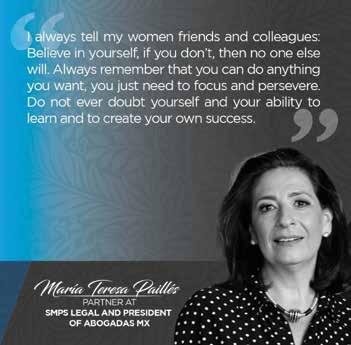
Early years and its founder
The Abogadas MX scheme in Mexico arises from the dream of a lawyer, Valeria Chapa, who was convinced of the need to support women at the beginning of their professional career. She found a group of women lawyers with some professional experience and persuaded them to start a pilot mentoring scheme to help younger women lawyers realise their full potential and ensure they did not face the same obstacles she had done.
The project started initially with just twenty mentors and twenty mentees. However, we soon saw the need for a more powerful initiative to empower women in the legal profession and just a year later we formally created an organization. This was with the following mission statement: "We work so that every woman lawyer in Mexico can develop in an inclusive, professional and safe environment and has the tools to reach their full potential and become an agent of change.”
2022: its growth and projects

Eight years after its foundation, Abogadas MX has had an impact on more than 45,000 lawyers in Mexico who have participated in different initiatives and/or have joined our organization or follow us on our social networks. Today, more than 1000 lawyers have participated in our mentoring scheme, and we have secured the sponsorship of more than 50 organizations which includes the most recognized law firms in Mexico and the US as well as large national and international companies.
However, we realized, during the last eight years, that we could not find formal data which evidenced the challenges that women lawyers in Mexico face. Therefore, we decided to carry out the “Study and analysis of MX Lawyers: inclusion of women in leadership positions” with the support of IPADE. We interviewed 313 women lawyers in Mexico, at different stages of their professional life, to identify the main challenges and barriers they face.
Study and analysis of MX Lawyers: inclusion of women in leadership positions
25% said their organization has an inclusive work culture 24% reported that their organization values inclusion. 90% of the participants considered that work models without consideration of work-life balance hinder the growth of women professionally.
The survey also found that how women perceive themselves was a disadvantage. 83% of respondents aspired to leadership positions, yet, 55% of respondents doubted their ability to compete for these positions.
Other obstacles were the lack of knowledge or skills needed for professional development since 77% of respondents considered that they lack the ability to generate professional networks.
30 | LegalWomen International
Inclusion and empowerment in the workplace – win/win The inclusion and empowerment of women is a winning strategy for any organization or country. Several international organizations endorse this, for example, it has been seen that the more women participate in the public administration of a country, the lower the levels of corruption there are. In addition, increasing women’s participation in the labour force leads to faster economic growth.
This analysis further gave us important signals in terms of where we should concentrate our work and has informed our working model, to support and encourage women which consists of four main pillars.
The Four Pillars
PROFESSIONAL DEVELOPMENT
We offer technical training tools through workshops, seminars and scholarships for postgraduate studies in conjunction with some of the universities and law schools. We also deliver a class at the most prestigious Law Universities in México in order to provide knowledge and help future lawyers in terms of diversity, leadership and inclusion in the legal sector.
HUMAN DEVELOPMENT
We provide tools for the development of models that offer a balance in the professional, family, social and intellectual arena through different workshops.
ENVIRONMENTAL IMPACT
We seek to leave a mark on following generations. To achieve this, we create partnerships with international organizations and civil society associations, such as the Study on Judicial Independence and the participation of women in the judiciary or Minimum Standards of Diversity and Inclusion for law firms in Mexico, with which we intend to lay the foundations in terms of diversity and inclusion. There have been 38 Mexican or international firms who have so far participated in the first stage of the project whose guide is the Women’s Empowerment Principles (WEP) promoted by UN Women.
We also have a scholarship programme for university students where every year we award 50-100 percent scholarships in order that future lawyers can study English classes, financial education, and participate in internships within law firms and have access to an annual workshop.
GENERATION OF A SUPPORT NETWORK OR NETWORKING
We promote collective collaboration among women and raise awareness about the benefits of generating professional networks.
There are two additional initiatives that impact on the four “pillars” described above:
� Annual leadership and professional development workshop: Our flagship event brings together more than 600 lawyers in the country, providing them with a space to develop skills, networking and a platform for interaction between colleagues.
� Mentoring programmer: We pair a mentor with a lawyer at the beginning of their professional journey in order receive support and work on some aspect that allows them to grow personally and professionally.
The positive economic impact of women working
The legal sector market indicates that more women working has a positive economic impact and generates greater opportunities. Abogadas MX therefore advocates promoting the creation of a legal culture which includes the gender perspective as fundamental. This in turn improves competitiveness, eliminates biases and challenges traditions for the Mexican culture and economy.
The current law reform supports the efforts of Abogadas MX, such as, the Mexican Constitution in the matter of human rights or the reforms to the Federal Labour Law to deter and punish situations of violence against women in the workplace. These are important legal advances as they create a binding precedent to follow for States, companies, and individuals.
The realities of diversity and inclusion in the professional field is extremely complex but we have witnessed positive changes and significant effects. There is more to do, and our work would not be possible without the support of law firms and organizations that believe in the importance of change and promote inclusive policies in the workplace.
At Abogadas MX we propose and promote programmes that contribute to a culture of inclusion and diversity so that the country’s lawyers are agents of change now and in the future. �
Antonia Rodriguez Executive Director Abogadas Mx

LegalWomen | 31 International
London to China: The Win/Win of Remote Working


Trading a position as a promising associate in a big law firm for the night shift in a non-client facing role is not an obvious career move. But it is one of the best career decisions I've made to date, and I'm grateful to Withers LLP for not just accepting this change, but for embracing it.
Just over a year ago, I left what might be called a standard career path doing client-facing work as an associate lawyer. I then switched to a hybrid role working part-time as a salaried knowledge lawyer, with my client work now done flexibly on a zero-hours contract.
My reasons for the move were two-fold: the first was that I was returning to work after having my son, who is now just shy of two. The second, more unusual reason, was that our new family of three was about to relocate from London to Beijing, an 8-hour time difference away, for my partner's work.
I cannot deny that I felt uncertain about the decision. Wary of stepping off the standard trajectory and unsure about moving to a fully remote working arrangement where I thought colleagues might forget I exist. I was wrong to worry. My two roles have proved to be hugely complementary. I'm a better knowledge lawyer for keeping my client skills up, and for being able to understand what my colleagues need to know and how they might use the information I provide. But, just as importantly for the firm, I'm a better client lawyer for the increased knowledge at my fingertips.
Remote working with a time difference has also proved to have more advantages than disadvantages, from both a work and a personal perspective. The firm can have work turned around overnight and in a client’s or a colleague's inbox by 9 am. Since I work partly when London is awake and partly when it is asleep, I can interact with colleagues and still have time free from distractions. I also appreciate the asynchrony in my personal life; I can spend time with my son without being concerned that my inbox is filling up.
Looking back on 2020-2021, it is difficult to convey how unnerving it was to experience all of those life changes at once. And it certainly was not all plain sailing. A low point was when
my son tested positive for Covid just before we were due to take our much-anticipated flight to Beijing (spectacularly well-timed to be the day after we'd waved goodbye to all of our worldly possessions on a truck destined for Beijing and signed our house over to tenants). China's zero-Covid policy and the fact that you will struggle to enter the country if you've so much as recently glanced in the direction of a coronavirus meant that we weren't able to fly to Beijing and be reunited with our possessions for five months. We eventually made it to our destination by a somewhat convoluted route, spending a few weeks with my inlaws in England, and then a further few weeks in Taiwan.
However, with the benefit of hindsight, all this change proved to be empowering. I have a much better relationship with work, having made a conscious decision to continue working rather than be a trailing spouse, and I have far greater agency over what my role and its terms look like. Withers has been incredibly supportive and open to non-traditional ways of working. A firm that looks at my working arrangements and sees only difficulties and disruption, rather than opportunity, would be missing a trick to say the least.
Pitch for the terms you want
What does any of this mean for others? I'm certainly not suggesting having a baby and moving continents as universal career advice. But I do think each of us should make time to think about what set-up works best both for us as individuals and for our colleagues, and then advocate for it. The likelihood is that there is something to be gained all round. 'I want to escape the daily grind' is probably not a good pitch and too one-sided. But 'I want to work remotely as part of a dual-career couple and provide an overnight service for the team' proved, in my case, to be just the right pitch. And my firm, colleagues and clients quickly saw the major benefits.
Women are famously reticent to negotiate with their employers, yet they sometimes have the greatest need, given that children often have a large impact on their careers. So, as the Chinese would say: Jiãyóu (Go for It!). �
Harrison Knowledge Lawyer, Family, Withers
32 | LegalWomen
Victoria
Liangma river in central Beijing, Seine of Beijing.
Gubei Water Town, Beijing A weekend getaway.
The new legal competitive advantage
What should law firms prioritise as we move toward 2023? As new research from legal software provider Clio reveals, the answer above all else is adaptability. Ever-evolving working habits, new client expectations, and challenging market conditions mean that standing still in today’s landscape is the same as going backwards.

Clio’s brand-new Legal Trends Report shows just how profound an impact this constant change is having on law firms. It also highlights how firms can make themselves adaptable (and even antifragile) by adopting legal technology. The right solutions will allow law firms to meet both their clients’ and staff’s expectations –which will play a key role in helping law firms survive in what may be turbulent times ahead.


Why firms must adapt to lawyers’ changing working habits
The pandemic forever changed how lawyers want to work. Indeed, the 2022 Legal Trends Report shows that:
� 44% of lawyers are more likely to want to work throughout the day rather than a traditional 9-to-5 schedule � 45% prefer meeting clients virtually � 49% of lawyers say they prefer to work from home
Client expectations also continue to change
While firms must increasingly cater to their lawyers’ working preferences (especially if they want to keep hold of top talent), client demands are also a paramount concern. The Legal Trends Report found that:
� 35% of clients prefer virtual meetings, compared to 28% who prefer meeting in person � 70% of consumers want the option to pay a lawyer via a payment plan � 68% want to communicate with their lawyers over the weekend
The solution? Cloud-based legal software
Cloud-based legal software plays a vital role when it comes to law firm adaptability. These tools enable seamless virtual collaboration between law firm colleagues, and between lawyers and their clients. They automate administrative work – meaning no more precious hours wasted on low-value tasks. In fact, Clio’s research shows that the impact of legal software extends beyond helping lawyers fulfil their work commitments.
Lawyers using cloud-based legal software to manage their practice were:
� 60% more likely to have positive relationships with their clients � 44% more likely to have positive relationships with colleagues � 29% more likely to be happy with their professional life

These findings are just a snippet of those contained in Clio’s in-depth 2022 Legal Trends Report, the seventh iteration of this industry-leading publication. Based on aggregated and anonymised data from tens of thousands as well as surveys of thousands of legal professionals and consumers, it highlights some of the most pressing issues facing law firms today.

Get your free copy at clio.com/uk/LTR-women �
Social Media
We are open to new ideas or partnering for campaigns. Please contact info@LegalWomen.org.uk ■
LegalWomen | 33 Advertisement Feature
Legal Women is active on three sites, Instagram, LinkedIn and Twitter.
L
Many thanks to our social media team: Charity Mafuba, Agnes Swiecka, Elizabeth Shimmell and Emma Webb.
W
Charity Mafuba
Elizabeth Shimmell
Agnes Swiecka
Emma Webb
Three things we can learn from digital-first law firms about technology and conveyancing
By Bronwyn Townsend, Senior Marketing Manager, InfoTrack
Only 5% of law firms scored above 80% when assessed for their digital maturity in the conveyancing process according to the Digital Conveyancing Maturity Index. These firms are the trailblazers. The pioneers. The leaders.
Early adopters are essential for the evolution of an industry. They are those leading the way on the implementation of new systems and keep the needle moving. This remains true with the conveyancing sector too. Law firms which are adopting digital tools are reaping the rewards; time-savings, productivity, and better risk mitigation.
The solutions these leading firms are adopting span the entire conveyancing process from new business management and client onboarding to post-completion. They’re the firms that scored higher than 80% when the industry average is just 43%. These are the firms the rest of the industry will watch and learn from.
What are the key takeaways we can learn from these digital adoption leaders? Based on the Digital Conveyancing Maturity Index, here are the three most important discoveries from the research.
1. Case management system integration is pivotal
To maximise the currently available technology, law firms must integrate their service suppliers with their case management system. Two-way integration, the kind that pushes and pulls data between various digital tools, creates a single source of
First non-barrister appointed to the Court of Appeal

The Ministry of Justice has announced that solicitor Lady Justice Falk has been appointed to the Court of Appeal. It is the first time since 2020 that there has been a nonbarrister on the Court of Appeal.
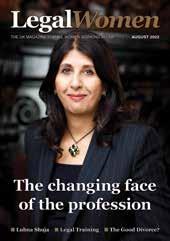
This is a outstanding achievement and the Law Society of England and Wales President Lubna Shuja said: “On behalf of the solicitor profession I would like to offer my congratulations to Lady Falk. Solicitors bring particular skills and experiences to the judicial process and decision-making. They also come from more diverse backgrounds than the barristers who traditionally populate the bench.”
Lady Falk is currently the only solicitor on the Court of Appeal, and will be the twentieth Lady Justice of Appeal ever, which demonstrates there is still much progress to be made before the judiciary reflects wider society. It does, however, show that solicitors with judicial aspirations should not limit their ambitions. �
truth, saves time, and mitigates many risks associated with the rekeying of data.
2. Automation is key
The pre-completion process is the least mature across the board when it comes to the adoption of digitalisation by conveyancers, with an average score of 30%. It’s also the largest and most labour-intensive part of the process. Automation of administrative tasks and pre-population can all have a major impact on law firm productivity. Automation is also saving these digitally savvy firms hours on manually updating their clients. By using digital tools to automate the process before clients chase, they’re saving hours every week.
3. eSignatures are a quick win
78% of firms are already using eSignatures, though not evenly across the entire process. For the firms already using eSignatures for part of the process, ensure you’re using them for Land Registry and mortgage deeds, not just onboarding. If you’re not using them at all, eSignatures are one of the quickest ways to incorporate digitisation into your conveyancing process and you’ll see the rewards swiftly.
These firms are showing us all that end-to-end digital conveyancing is a reality and it’s available to law firms now. So, why not join them? ■
Would you like to feature in Legal Women?
To advertise in Legal Women, please call Catherine McCarthy our Business Features Editor on 0151 236 4141 or email catherine@ benhampublishing.com
34 | LegalWomen Advertisement Feature
Getting women and their advocates on-board in law
The photographs say it all – this was not the usual afterwork talk and networking event. So full marks for prioritising this important topic and putting the event on at lunchtime. It was a refreshing change to take some time out of the day to meet lawyers and concentrate on issues.
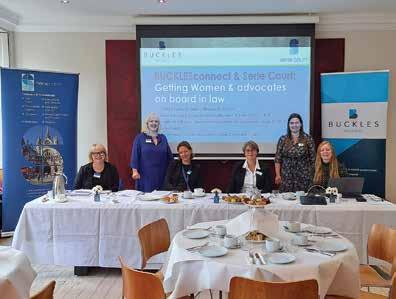
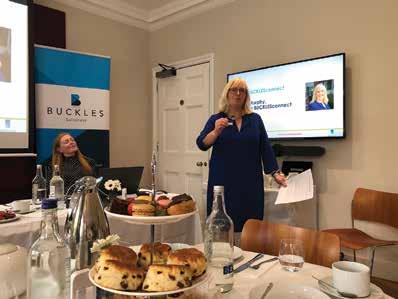
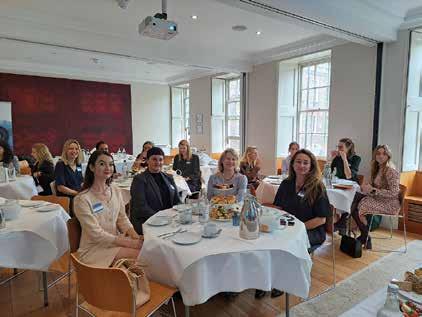
BUCKLESconnect & Serle Court panel of speakers included: Karen Jones, Citywealth, Stephanie Bell BACP, the Carvalho Consultancy, Sarah Rushton, Buckles LLP and Kathryn Purkis, Serle Court. All gave excellent, informed talks and subsequently the attendees were able to discuss issues informally on the round tables and, of course, eat scones!
Karen Jones highlighted that this is a unique time as workplaces grabble with the issue of succession. Most women lawyers are the first or second generation of women who have worked most of their lives; how will that legacy continue; how do workplaces handle the retirement of senior female lawyers and ensure there is a pipeline of women to take their place? The strength of cultural norms means we know there needs to be an active strategy – do not assume it will just happen. We’ve seen that women simply qualifying in equal numbers for decades has not led to similar numbers of women in senior legal positions.
Unpaid work is a substantial part of most women’s lives, even for those of us who work full-time. As well as housework and family responsibilities women also volunteer for the ‘nonprofit’ jobs at work (see Helen Broadbridge’s fascinating blog Volunteering (legalwomen.org.uk)).
Karen also discussed her experience of men speaking regularly to head-hunters to understand the market and know their worth, even if there is no intention to change jobs. Women are far less inclined to get this insight. Equally, men have no guilt in a long lunch and recognising that socialising is all part of networking and gaining insights. Karen joked how much less fun it is to meet women who often arrive late for lunch and are still prioritising files in their head, while attempting to socialise.
Karen’ final tip was to decide on your rhythm and what works for you in terms of attending events. This seminar showed that lunchtime is perfect for some people, so next event you hold, think about varying the time of day or format. It may be different people who will attend which will widen your network. �
Coral Hill Founder & Editor-in-Chief
LegalWomen | 35 Events
Review: Prima Facie

Mega-talented Liverpool-born actress Jodie Comer (Killing Eve) made a stunning West End debut earlier this year in the Harold Pinter Theatre’s production of this astonishing one-woman show, written by Suzie Miller. The multi-award winning production will be moving to Broadway in 2023, but is presently available to view at cinemas throughout the UK. I was fortunate enough to see a performance at the Uckfield Picture House in East Sussex, on a rainy afternoon not too long ago.
The play was commissioned by a small legal charity which provides workshops to secondary schools and youth groups to help adolescents understand legal definitions of consent and assault. The Schools Consent Project was established in 2014 by barrister Kate Parker, who is said to have inspired the main character. Tickets to the show have been given away free to partner school groups working with the Schools Consent Project and the production has also donated money from ticket sales and raised funds by including information about the charity’s important work with young people in their publicity materials and programmes. It’s fantastic to see a partnership between the arts and legal training for young people. Comer emphasises the importance of this conversation: “The Schools Consent Project is something that I wish had been available to my friends and me growing up. It’s crucial that we include younger people … it’s an honour to be able to partner with this great initiative.”
The play tells the story of a talented, young barrister called Tessa who grew up in a working-class home in Liverpool. She works in criminal defence, specialising in rape trials, and her
Although I found the plot slightly contrived, it certainly packs a strong punch as the audience first glimpses the workings of a brilliant mind before plumbing the depths of Tessa’s soul in tragic circumstances. Comer’s range is breath-taking, and she commands the stage for almost two hours without any break, playing not only Tessa, but also other minor characters. Her accent adjusts as she travels on the train from Euston to Liverpool and another Tessa emerges in scenes with her family at home. She is responsible for all scene changes, moving furniture and props with what seems like effortless grace.
I was left with a sense of awed respect for such mastery of thespian arts and a broken heart for the injustices caused by a lack of understanding of the meaning of consent, even amongst the brightest of individuals. This is an issue which can affect anyone at any time and it has been portrayed in Prima Facie with virtuoso skill. Please see this outstanding performance at a local cinema if you can. �

Poetry Corner
By Serena Reynell
36 | LegalWomen
career trajectory has propelled her to the top of her profession. She often finds herself cross examining rape victims, tearing apart their versions of events as little more than an intellectual exercise. However, when she is a victim of sexual assault, she finds herself on the other side of the justice system and it is a cruel awakening.
Review
Jordan Lancaster
Keep quiet? Speak up? Second guess Feel stuck When to push? Assert yourself? Hard to know Where to place Oneself
Courtesy of National Theatre
TV
LW | Recommends
TALK
A Private Affair: Un Asunto Privado
This eight-part TV series has had mixed reviews but is an entertaining production which allows the lead role to be female despite being set in the 1950s. Aura Garrido acts the part of a daring privileged woman with a knack for detective work. She is frustrated by the restrictions on her life as a woman and is determined to investigate a murder crime herself. She is ably assisted by a long-suffering butler acted by Jean Reno. �
PODCAST
In Our Time
This long-running series hosted by Melvyn Bragg considers the impressionist artist, Berthe Morisot (1841-1895). She was highly esteemed in her lifetime and exhibited at the prestigious Salon de Paris as well as all but one of the impressionist exhibitions held between 1874 and 1886.


The podcast discusses her life, work and legacy. An exhibition of work is to be held at The Dulwich Gallery in London in 2023 Berthe Morisot: Impressionism and the 18th Century | Dulwich Picture Gallery
https://www.bbc.co.uk/sounds/play/m001cxwl �
EVENT
Fawcett Society: Our Feminist Recovery: Resting, Reviving, Resisting AGM and Conference is on Saturday 19 November at King’s House, London.
There will be a diverse range of inspirational activists, change-makers and political leaders for breakout sessions, panel discussions and networking. There is confirmed attendance from Ayesha Hazarika, Stella Creasy MP, Anum Qaisar MP, Halima Begum of Runnymede Trust, Mandu Reid of the Women’s Equality Party and leading barrister and campaigner, Dr Charlotte Proudman

You can find our more here Fawcett website
Conference tickets cost £25 for members and £15 for concessionary members. �
Centenary of the admission of women lawyers

Legal Women’s first in-person event: Lubna Shuja, President of The Law Society of England and Wales, will speak at Macfarlanes LLP, London –Wednesday 14 December 6pm.
See Events page on www.LegalWomen.org.uk �
BOOK
Duplicity ‘My Mothers’ Secrets’ by Donna Freed
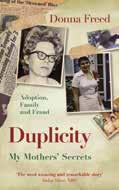

Donna was six years old when her sister casually told her that she and her siblings were all adopted. It was a revelation that fractured her sense of identity but remained one of those things left unsaid within the family. Later, when her complicated and unconventional adoptive mother died, Donna was left feeling exposed, her life un-witnessed without a mother to look over her.
So, she decided to investigate her origins and began the search for her birth mother. Trawling through records, she discovered she had been adopted through the notorious Louise Wise Adoption Service based in Manhattan and since exposed as corrupt and unethical, but that was just the beginning. As she dug deeper, she discovered that her birth parents had been involved in an explosive and salacious story, one of the biggest true crime stories to grip the USA in the late 1960s. �
PLAY Prima Facie
Many readers have recommended this play. Although the live performances sold out rapidly, there are cinema showings of the recording with the added bonus of a Q and A. It is still a powerful experience producing many strong reactions and much to debate. See the full review on page 36. �
LegalWomen | 37 LW Recommends
Poppy’s second chance at love
oppy’s owner first contacted her local rehoming centre and said she needed to hand Poppy, a four year old Chihuahua cross, over to us as she had sadly recently been given a diagnosis that she had a terminal illness. She was advised to apply for a free Canine Care Card and nominate a Dog Guardian; someone she trusts to sign over the care of Poppy to Dogs Trust should she need it. She’d then be able to spend the most time possible with Poppy and feel reassured that she’d be given the best possible care at Dogs Trust when they could no longer be together.
When Poppy’s Dog Guardian contacted us to advise that her owner was now receiving palliative care and that they needed to activate her Canine Care Card, Poppy was collected by Dogs Trust the very next day. After a vet and behavioural assessment we decided the best place for Poppy would be a loving foster home. We were able to advise the foster carers of all the information we’d been given by Poppy’s owner regarding her life, diet and routine to enable us to make this transitional period as stress-free as possible for Poppy.
Within almost no time, we were able to find very affectionate Poppy a lovely new home for her second chance at love. Poppy’s story is one of many we come across at Dogs Trust.
Many owners are growing increasingly worried about gradually losing their independence or their health deteriorating. Dogs Trust want to offer owners peace of mind that we will be there at this difficult time to care for and rehome their four legged friends should the worst happen.
Therefore we’re pleased to announce that we have extended our Canine Care Card service. Dogs Trust will care for your dog should you move into a care home, become seriously ill or pass away.


For more information on our Canine Care Card service and how to register your dog please type in this link www.dogstrust.org.uk/ccc where you will find our online application form and more information on our free service.
If you have any queries regarding the Canine Care Card please email CCC@dogstrust.org.uk or call 020 7837 0006 and we will be happy to help. �
Who’ll keep her happy when your client’s gone?
We will – as long as your client has a Canine Care Card. It’s a FREE service from Dogs Trust that guarantees their dog a second chance a life. At Dogs Trust, we never put down a healthy dog. We’ll care for them at one of our 21 rehoming centres, located around the UK. One in every four of your clients has a canine companion. Naturally they’ll want to make provision for their faithful friend. And now you can help them at absolutely no cost. So contact us today for your FREE pack of Canine Care Card leaflets – and make a dog-lover happy. E-mail ccc@dogstrust.org.uk Or call 020 7837 0006 Or write to: FREEPOST DOGSTRUSTL (No stamp required) Please quote “334975”
38 | LegalWomen Advertisement Feature
only
Channel Islands &
© Dogs Trust 2021
All information will be treated as strictly confidential. Service
available for residents of the UK, Ireland,
Isle of Man. A dog is for life, not just for Christmas® dogstrust.org.uk Registered charity numbers: 227523 & SC037843
P
Australia
G’day, InfoTrack is giving you the chance to win a once in a lifetime trip to Australia for you and a mate.


All you need to do is complete your daily legal tasks through InfoTrack. For every eCOS, Contract of Sale, Indemnity, Property Report , or AP1 performed, you’ll get an entry into the prize draw.
No hard yakka required, we’ll automatically enter you each time.
From exploring the ancient Daintree Rainforest and taking in the sights of Sydney Harbour to an arvo admiring Uluru, there’s heaps to do. And if you’re lucky enough, you might even spot a ‘roo.
For more information, visit www.infotrack.co.uk/takemetoaustralia Terms and conditions apply.
LegalWomen | 39
Win two amazing weeks Down Under with InfoTrack Take me to


LEAP offers cutting-edge, integrated legal technology expanding beyond traditional practice management software. Visit: leap.co.uk PracticeManagement L e gal Publishing DocumentAssembly & Management LegalAccounti n g The Legal Practice Productivity Solution


























































































































































